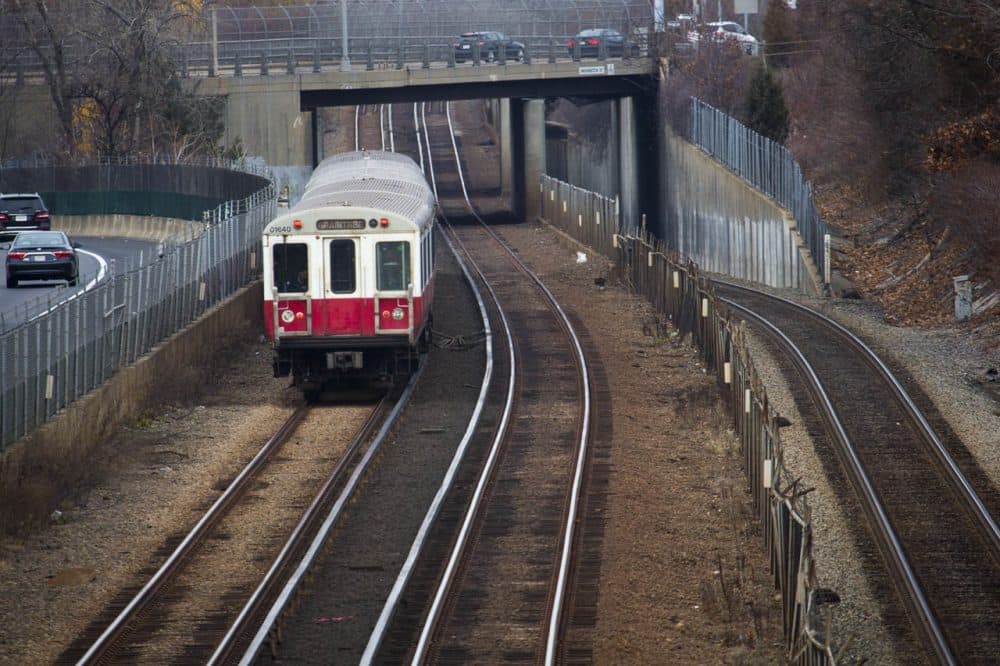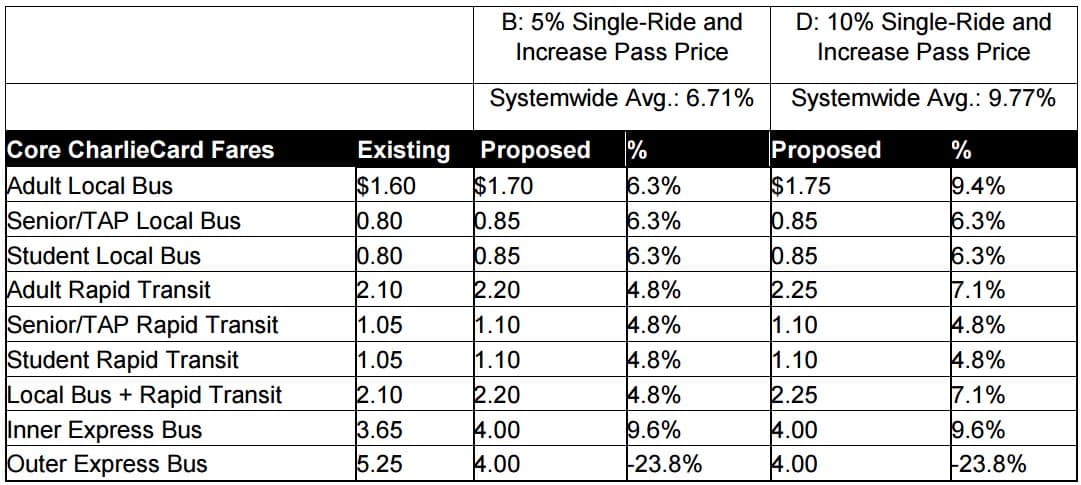Advertisement
Under New Proposals, MBTA Fares Could Increase By Up To 10 Percent

The MBTA's control board has outlined two fare hike proposals, as it looks for ways to close a projected $242 million budget deficit next fiscal year.
One option would increase fares by an average of 6.71 percent across the system, while the second option would increase fares by an average of 9.77 percent.
The prospect of fare hikes has been on the table for a while, and riders aren't thrilled about paying more for a system many say needs drastic service improvements — especially after last winter's widespread failures.
"T riders absolutely deserve better service and the question is what is the pathway to getting better service?" Transportation Secretary Stephanie Pollack said Monday. "The fare increase … is a reasonable contribution to ask our riders to make so that we can improve our service."
The T estimates that the 6.71 percent fare increase would generate an additional $33.2 million in revenue compared to fiscal year 2015, and cut its projected $242 million deficit for fiscal year 2017 by $9.8 million. The transit agency estimates the 9.77 percent increase would generate $49.4 million in additional revenue compared to fiscal year 2015, and cut the projected deficit by an estimated $26 million.
Within each scenario, the actual fare increases would vary widely depending on what mode of transportation you use and whether you choose to pay for individual rides or purchase a weekly or monthly pass.

Under the first option, monthly Link passes — which allow for unlimited trips on all subway and bus routes — would increase by 10 percent, from $75 to $82.50. Under the second option, Link passes would increase by about 12 percent, to $84.50.
Those who buy monthly bus passes face a more steep increase. The first option would see the cost of bus passes increase by 16 percent, from $50 a month to $58. The second option would increase the cost of a bus pass by 19.5 percent, to $59.75. Under both proposed scenarios, five and seven-day student passes would rise by 23.1 percent, from $26 to $32.
The increases in pass prices basically decreases the discount of buying a monthly pass. But Pollack said the proposed increases would still make the T's monthly passes cheaper than similar passes in other cities.
"We want to encourage pass use," Pollack said. "If we start to see drop off of pass use then we’ll take another look at it."
Advertisement
The average monthly pass user takes about 40 trips per month, according to the T. Riders would need to take less than that — about 37 trips — to break even under to the two fare hike proposals.
The two proposals would also affect monthly commuter rail passes — rising about 5 percent under the first option and 10 percent under the second option.
The cost of the T's paratransit service, The Ride, would increase by 5 percent for all trips under the first proposal. Under the second proposal, the cost of the standard service would rise by 8.3 percent, and the cost of the premium service — for areas that are more than three-quarters of a mile from a T station or bus stop — would rise by 10 percent.
The control board settled on the two fare hike packages during a meeting Monday; four were originally proposed.
Pollack said the T is also looking at ways to increase ridership and fare collection in order to bring in more fare revenue.
Transportation advocates and riders at the meeting expressed disapproval of the two proposals.
Jeremy Mendelson, of the advocacy group Transit Matters, called fare increases “a very regressive policy.” He said the system has inefficiencies that need to be addressed.
“We need to make better use of the service we have rather than trying to charge more,” Mendelson said after the hearing. “We should charge less in some places.”
Mendelson said the T could make better use of payment technology to help improve service. An as example, he said having a system that allows people to pay before getting on Green Line trains could speed up service by cutting down the time it takes to collect fares.
“If you simply increase the fares by 5 percent or 10 percent, you’re not really improving anything about the way the fares are collected,” he said. “You get a much bigger bang for your efforts by moving to an off-board payment systems.”
Many who attended the meeting also expressed concern that the fare hikes would decrease ridership.
Rafael Mares, an attorney at the Conservation Law Foundation, said fare hikes coupled with the current low gas prices could cause more people to take to the roads — leading to more traffic and air pollution.
“Ultimately for the folks that can make a choice, it is either you drive or you take the T,” Mares said. “If the cost of driving is down and the cost of the T is up, that’s how they will make their determination.”
Pollack said when the T last raised fares in 2014 ridership didn't drop, and the service has since attracted new riders.
Mares said he would have preferred the board move forward with a "reasonable" 5 percent increase across the board. He said the two options the board chose to move forward with punish riders.
"We’ve gone through a winter where people didn’t have any service and now ... this winter hasn’t really started yet and we’re looking at a fare increase that is beyond what was planned or predictable," Mares said.
The amount by which the T is actually allowed to raise fares is in dispute. Some lawmakers and transit advocates say a law passed in 2013 intended to cap fare increases at 5 percent every two years. But state transportation officials and some other lawmakers say the way the law is written makes it clear the limit is 10 percent. It's unclear if the Legislature will act to clear up the discrepancy now that the T is considering fare hikes over 5 percent.
Raising fares is just one of several steps the T is taking to try to close its projected deficit. Other measures include increasing advertising and parking revenue, ending late-night weekend service, and reforming high-cost areas such as bus maintenance. The T is also looking at privatizing bus routes with low ridership.
The T says it will collect public comment on the fare hike proposals through February, with a decision expected in March.
The fare hikes would take effect on July 1, with the new fiscal year.
The last time the T raised fares was July 2014, with a systemwide average increase of 5 percent.
This article was originally published on January 04, 2016.

